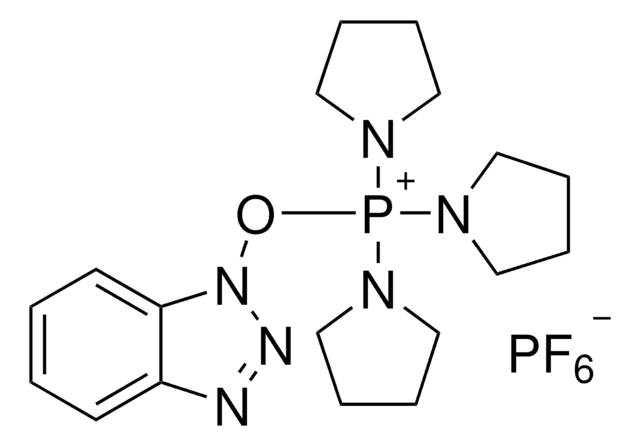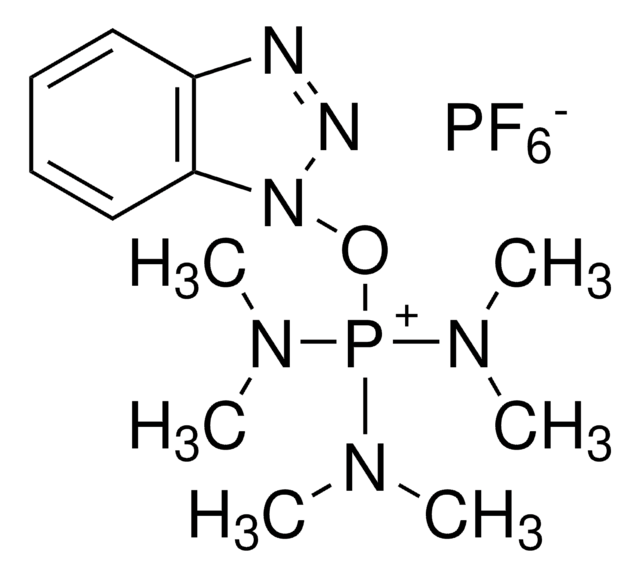12805
(Benzotriazol-1-yloxy)tripyrrolidinophosphonium hexafluorophosphate
≥97.0% (TLC), for peptide synthesis
Synonym(s):
PyBOP®
About This Item
Recommended Products
product name
(Benzotriazol-1-yloxy)tripyrrolidinophosphonium hexafluorophosphate, purum, ≥97.0% (TLC)
grade
purum
Quality Level
Assay
≥97.0% (TLC)
form
solid
reaction suitability
reaction type: Coupling Reactions
mp
~150 °C
154-156 °C (dec.) (lit.)
application(s)
peptide synthesis
storage temp.
2-8°C
SMILES string
F[P-](F)(F)(F)(F)F.C1CCN(C1)[P+](On2nnc3ccccc23)(N4CCCC4)N5CCCC5
InChI
1S/C18H28N6OP.F6P/c1-2-10-18-17(9-1)19-20-24(18)25-26(21-11-3-4-12-21,22-13-5-6-14-22)23-15-7-8-16-23;1-7(2,3,4,5)6/h1-2,9-10H,3-8,11-16H2;/q+1;-1
InChI key
VIAFLMPQBHAMLI-UHFFFAOYSA-N
Looking for similar products? Visit Product Comparison Guide
General description
Application
- As coupling reagent in the preparation strategies for peptide-oligonucleotide conjugates.
- Synthesis of structured pure triacylglycerol (TAG) regioisomers.
- As coupling reagent in the synthesis of a 3,5-pyrazolidinedione on soluble polyethylene glycol (PEG) polymer support.
- Synthesis of herceptin- nanoparticles.
Legal Information
Signal Word
Warning
Hazard Statements
Precautionary Statements
Hazard Classifications
Acute Tox. 4 Oral - Aquatic Acute 1 - Aquatic Chronic 1 - Skin Sens. 1
Storage Class Code
11 - Combustible Solids
WGK
WGK 3
Flash Point(F)
Not applicable
Flash Point(C)
Not applicable
Personal Protective Equipment
Choose from one of the most recent versions:
Already Own This Product?
Find documentation for the products that you have recently purchased in the Document Library.
Customers Also Viewed
Our team of scientists has experience in all areas of research including Life Science, Material Science, Chemical Synthesis, Chromatography, Analytical and many others.
Contact Technical Service

















![1,8-Diazabicyclo[5.4.0]undec-7-ene 98%](/deepweb/assets/sigmaaldrich/product/structures/120/564/5b373e23-1624-489c-8efb-692de0f96ffb/640/5b373e23-1624-489c-8efb-692de0f96ffb.png)
